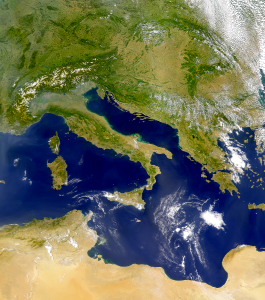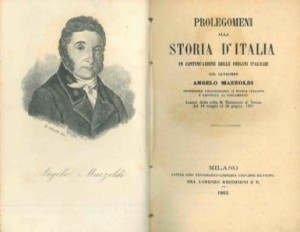Giuseppe Brex
Italy
Italy seems to have an uncertain etymology; Thucydides claims that Italos, the Sicilian king gave his name to Italy, while more recently Emilio Spedicato(h) considers that ”the best derivation we believe to be the one proposed by the Italian nuclear engineer Felice Vinci (1998), in his monograph claiming a Baltic setting for the Homeric epic: he derives Italia from the rare Greek word aithalia, meaning the smoking one.” This is thought to be a reference to Italy’s many volcanoes.
Italy today is comprised of territory south of the Alps on mainland Europe including a very large boot-shaped peninsula, plus Sicily, Sardinia and some smaller island groups, which along with the French island of Corsica virtually enclose the Tyrrhenian Sea.
The earliest proposal that Italy could be linked with Atlantis came from Angelo Mazzoldi in 1840 when he claimed that before Etruria, Italy had been home to Atlantis and dated its demise to 1986 BC. Mazzoldi expressed a form of hyperdiffusion that had his Italian Atlantis as the mother culture which seeded the great civilisations of the eastern Mediterranean region(b).
Some of Mazzoldi’s views regarding ancient Italy were expanded on by later scholars such as Camillo Ravioli, Ciro Nispi-Landi, Evelino Leonardi, Costantine Cattoi, Guido DiNardo and Giuseppe Brex. Ravioli sought to associate the Maltese island of Gozo with his proposed Atlantis in Italy.
The Italian region of Lazio, which includes Rome, has had a number of very ancient structures proposed as Atlantean; Monte Circeo (Leonardi) and Arpino(a) (Cassaro). Another aspect of Italian prehistory is the story of Tirrenide, which was described as a westward extension of the Italian landmass into the Tyrrhenian Sea during the last Ice Age, with a land bridge to a conjoined Sardinia and Corsica. At the same time, there were land links to Sicily and Malta, which were all destroyed as deglaciation took place and sea levels rose.
 It is surprising that so few researchers have commented on Italy’s part in Plato’s Atlantis narrative considering that he twice, without any ambiguity, informs us that the Atlantean domain extended as far as Tyrrhenia (modern Tuscany).
It is surprising that so few researchers have commented on Italy’s part in Plato’s Atlantis narrative considering that he twice, without any ambiguity, informs us that the Atlantean domain extended as far as Tyrrhenia (modern Tuscany).
Crit.114c. So all these, themselves and their descendants dwelt for many generations bearing rule over many other islands throughout the sea and holding sway besides, as was previously stated, over the Mediterranean peoples as far as Egypt and Tuscany. Tim.25a/b. Now in this island of Atlantis there existed a confederation of kings, of great and marvellous power, which held sway over all the island, and over many other islands also and parts of the continent; and, moreover, of the lands here within the Straits they ruled over Libya as far as Egypt, and over Europe as far as Tuscany. (Bury)
The quotation from Timaeus is most interesting because of its reference to a ‘continent’. Some have understandably but incorrectly claimed that this is a reference to America or Antarctica, when quite clearly it refers to southern Italy as part of the continent of Europe. Moreover, Herodotus is quite clear (4.42) that the ancient Greeks knew of only three continents, Europe, Asia and Libya.
Philo of Alexandria (20 BC-50 AD) in his On the Eternity of the World(g) wrote “Are you ignorant of the celebrated account which is given of that most sacred Sicilian strait, which in old times joined Sicily to the continent of Italy?” (v.139).>The name ‘Italy’ was normally used until the third century BC to describe just the southern part of the peninsula(e).<Some commentators think that Philo was quoting Theophrastus, Aristotle’s successor. This would push the custom of referring to Italy as a ‘continent’ back near to the time of Plato. More recently, Armin Wolf, the German historian, when writing about Scheria relates(f) that “Even today, when people from Sicily go to Calabria (southern Italy) they say they are going to the ‘continente’.” This continuing usage is further confirmed by a current travel site(d) and by author, Robert Fox[1168.141]. I suggest that Plato used the term in a similar fashion and can be seen as offering the most rational explanation for the use of the word ‘continent’ in Timaeus 25a.
When you consider that close to Italy are located the large islands of Sicily, Sardinia and Corsica, as well as smaller archipelagos such as the Egadi, Lipari and Maltese groups, the idea of Atlantis in the Central Mediterranean can be seen as highly compatible with Plato’s description.
If we accept that Plato stated unambiguously that the domain of Atlantis included at least part of southern Italy and also declared that Atlantis attacked from beyond the Pillars of Heracles, then this appellation could not be applied at that time to any location in the vicinity of the Strait of Gibraltar but must have been further east, probably not too far from Atlantean Italy. This matches earlier alternative locations recorded by classical writers who placed the ‘Pillars’ at the straits of Messina or Sicily. I personally favour Messina, unless there is stronger evidence that some of the islands in or near the Strait of Sicily such as the Maltese or Pelagian Islands or Pantelleria were home to the ‘Pillars’.
(a) http://www.richardcassaro.com/hidden-italy-the-forbidden-cyclopean-ruins-of-giants-from-atlantis
(b) Archive 2509P (Eng) Archive 2943 (Ital)
(c) Archive 2946
(d) Four Ways to Do Sicily – Articles – Departures (archive.org)
(e) https://profilbaru.com/article/Name_of_Italy *
(f) Wayback Machine (archive.org)
(g) http://www.earlychristianwritings.com/yonge/book35.html
(h) http://2010-q-conference.com/ophir/ophir-27-10-09.pdf
Brex, Giuseppe
Giuseppe Brex (1896-1972) was an Italian writer who followed in the footsteps of Angelo Mazzoldi and promoted the idea of Italy as the source of civilisation in the Mediterranean, with perhaps the Sicilians contributing disproportionally to the cultural development of Italy. His views were expressed in his 1944 book Saturnia Tellus. There is very little about Brex on the Internet except an excerpt from a book, Roma prima di Roma (Rome before Rome) by Paolo Galiano(a).
Mazzoldi, Angelo
Angelo Mazzoldi (1799-1864) was born in Montichiari, near Brescia in northern Italy. He studied law and also wrote on historical subjects.  His best known was published in Milan in 1840 with the snappy title of Delle origini italiche e della diffusione dell’incivilimento italiano all’Egitto, alla Fenicia, alla Grecia ea tutte le nazioni asiatiche poste sul Mediterraneo (Of the Italic origin and spread of civilization Italian Egypt, Phoenicia, Greece and all Asian nations located on the Mediterranean)(a) . This provoked a critical response from the journalist Aurelio Bianchi-Giovini (1799-1862) and a debate ensued over the following two years (c).
His best known was published in Milan in 1840 with the snappy title of Delle origini italiche e della diffusione dell’incivilimento italiano all’Egitto, alla Fenicia, alla Grecia ea tutte le nazioni asiatiche poste sul Mediterraneo (Of the Italic origin and spread of civilization Italian Egypt, Phoenicia, Greece and all Asian nations located on the Mediterranean)(a) . This provoked a critical response from the journalist Aurelio Bianchi-Giovini (1799-1862) and a debate ensued over the following two years (c).
Emiliana Pasca Noether in her Roots of Italian Nationalism 1700-1815[0958], recounts how Mazzoldi claimed that before Etruria, Italy had been home to Atlantis and dated its demise to 1986 BC and is recalled locally as the destruction of Tirrenide.
Similarly, Pierre Vidal-Naquet described Mazzoldi as having “carved out a place for Atlantis in the Italians’ own history”[0580]. Mazzoldi expressed a form of regional hyperdiffusion that had his Italian Atlantis as the mother-culture which seeded all the great civilisations of the eastern Mediterranean region.
Some of Mazzoldi’s views on ancient Italy were expanded on by later scholars such Camillo Ravioli, Ciro Nispi-Landi, Evelino Leonardi, Constantine Cattoi, Guido DiNardo and Giuseppe Brex (b).
(a) https://archive.org/details/delleoriginiita02mazzgoog
>(c) Archive 2509 (Eng) Archive 2943 (Ital)<
Italian Atlantology *
Italian Atlantology can be traced back to the 16th century when Fracastoro, Garimberto and Ramusio, identified the Americas as Atlantis. In fact, we should look to the 15th century when Ficino was the first to translate Plato’s entire works into Latin giving medieval Europe its first access to the complete Atlantis texts. Not much happened until 1788 when Carli attributed the destruction of Atlantis to a close encounter with a comet. In 1840, Angelo Mazzoldi proposed Italy as the location of Atlantis and as the hyper-diffusionist mother culture of the great civilisations of the Eastern Mediterranean region. He was followed by others such as Giuseppe Brex(b).
Two years after Donnelly published his Atlantis in 1882 the Italian, D’Albertis followed him and opted for the Azores as the remains of Atlantis.
Not much developed in pre-war Italy apart from Russo’s journal which ran from 1930 until 1932. After the war, other Atlantis journals were established by Gianni Belli(d) in 1956 and Bettini in 1963 and reportedly one in Trieste by Antonio Romain & Serge Robbia(c).
After that, there was a wide range of theories advanced by Italian researchers. Spedicato located Atlantis in Hispaniola, Stecchini opted for São Tomé, Barbiero, who although Croatian by birth was an admiral in the Italian Navy nominated the Antarctic as the home of Atlantis before the Flem-Aths published their Antarctic ideas. Bulloni chose the Arctic, Pincherle identified the Mandaeans as the last of the Atlanteans and Monte links Thera with Tarshish.
In recent years the most widely reported Atlantis theory to emanate from Italy came from Sergio Frau who advocates Sardinia as the original Atlantis. However, this idea is not new having been promoted by Poddighe in 1982. Frau has subsequently been supported by other commentators such as Tozzi and Novo. I cannot help feeling that there might be a trace of nationalism underlying this theory, a suspicion that I have held regarding writers of other nationalities.
The latter end of the 20th century saw the development of the Internet which enabled the instant promotion of Atlantis theories, both silly and serious, to a global audience. Italy was no exception, where websites, such as Edicolaweb that are sympathetic to the exploration of historical mysteries emerged(a).
More recently, Marin, Minella & Schievenin had The Three Ages of Atlantis[0972] published in 2014. This is an English translation of their original 2010 work. In it, they suggest that Atlantis had originally existed in Antarctica and after its destruction survivors established two other Atlantises in South America and the Mediterranean. Perhaps more credible is the theory of Capuchin friar, Antonio Moro(f)who, in 2013, suggested that Atlantis had included Iberia, the south coast of France and the west coast of Italy![0974]
I must include here a mention of the website of Pierluigi Montalbano where he and various guest authors have written many interesting articles, particularly about Sardinia and its Nuraghic past as well as Atlantis. The site is well worth a browse and as it has Google Translate built-in it is accessible to all(e).
(a) https://web.archive.org/web/20140625081839/https://edicolaweb.net/cerca.htm
(c) Atlantis, Vol 16, No.2, April 1963.
(d) 025_028.PDF (uranialigustica.altervista.org)
(e) https://pierluigimontalbano.blogspot.com/2014/04/uno-tsunami-cancello-la-civilta-nuragica.html
(f) Atlantide (archive.org) (Italian) *
